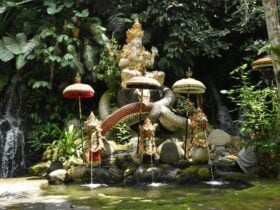Bali Farm House

1. Introduction to Bali Farm House

Located in the serene countryside of Bali, away from the bustling tourist hubs, Bali Farm House offers visitors an authentic rural experience that showcases the island’s rich agricultural heritage. This rustic retreat is designed to give guests an immersive glimpse into traditional Balinese farming practices, allowing them to connect with nature and experience the beauty of Bali’s rural landscapes.
Bali Farm House serves as a working farm that combines agriculture with tourism, giving visitors an opportunity to witness firsthand how local farmers cultivate crops, care for livestock, and maintain a sustainable lifestyle. The farm is a perfect destination for those who wish to escape the fast pace of modern life and reconnect with the earth, while also gaining valuable insights into Bali’s farming culture. From farm-to-table experiences to interactive farming activities, Bali Farm House offers an enriching experience for travelers of all ages.
2. Location and How to Get There
Bali Farm House is located in the Tabanan Regency, one of Bali’s most fertile and agriculturally rich regions. Tabanan is known for its lush rice terraces, cool climate, and picturesque villages that are nestled among the hills and valleys. The farm is approximately 45 kilometers from Denpasar, making it an easy day trip for visitors staying in central or southern Bali.
To reach Bali Farm House, you can hire a private car or scooter, or join a guided tour that includes transportation. The scenic drive to Tabanan offers beautiful views of Bali’s countryside, with rolling hills, terraced rice fields, and traditional villages lining the route. The location is also close to other popular attractions, such as the Jatiluwih Rice Terraces and Batukaru Temple, making it an ideal stop on a cultural and nature-focused Bali itinerary.
3. The Experience at Bali Farm House

Bali Farm House provides visitors with a hands-on, immersive experience that highlights Bali’s traditional farming techniques. The farm is designed to be educational, allowing guests to learn about the processes involved in growing crops, raising livestock, and maintaining sustainable agricultural practices. Here’s what you can expect during your visit to Bali Farm House:
a. Exploring the Organic Gardens:
One of the highlights of the farm is its extensive organic gardens, where a variety of fruits, vegetables, and herbs are grown without the use of chemical fertilizers or pesticides. Visitors can take a guided tour of the gardens and learn about organic farming techniques, soil preparation, crop rotation, and composting. The farm grows a range of crops, including rice, corn, beans, spinach, chili peppers, and medicinal herbs, all of which are used in the farm’s kitchen or sold at local markets.
During the tour, guests are encouraged to participate in activities such as planting seeds, harvesting vegetables, or even learning how to prepare natural fertilizers from organic materials. This hands-on approach allows visitors to gain a deeper understanding of sustainable farming practices and the importance of organic agriculture in preserving Bali’s environment.
b. The Rice Fields:
No visit to Bali would be complete without experiencing the iconic rice terraces, and Bali Farm House offers a unique opportunity to explore them up close. The farm is home to its own rice fields, where visitors can witness the entire process of rice cultivation, from planting to harvesting. Depending on the time of year, guests may even have the chance to join the local farmers in planting or harvesting rice by hand, a time-honored tradition that has been practiced for centuries in Bali.
The farm’s rice fields are a stunning example of the subak system, an ancient irrigation method that is unique to Bali. This system, which relies on water-sharing among farmers in a cooperative network, has been recognized as a UNESCO World Heritage site. Visitors will learn about the cultural and spiritual significance of rice farming in Bali, as well as the intricate techniques that make the subak system so effective in sustaining the island’s agricultural communities.
c. Livestock and Animal Husbandry:
Bali Farm House is also home to a variety of farm animals, including chickens, ducks, pigs, and cows. Visitors can observe the daily care of these animals and learn about their role in Bali’s traditional agricultural system. For example, cows are not only used for plowing the fields but also provide valuable manure for composting and enriching the soil.
The farm encourages a hands-on approach to animal husbandry, allowing guests to feed the animals, collect eggs from the chicken coop, or help milk the cows. This interactive experience is particularly enjoyable for families with children, as it provides a fun and educational opportunity to engage with farm animals and understand their importance in a self-sustaining agricultural system.
4. Farm-to-Table Dining Experience
One of the most popular aspects of Bali Farm House is its farm-to-table dining experience. The farm has its own kitchen and café where fresh, organic ingredients harvested from the farm are used to prepare delicious and nutritious meals. The menu reflects traditional Balinese and Indonesian cuisine, with a focus on healthy, natural ingredients.
Visitors can enjoy a variety of dishes, such as nasi campur (a mixed rice dish with vegetables, tofu, and tempeh), freshly made salads, and herbal teas brewed from plants grown in the farm’s garden. The meals are prepared using time-honored cooking techniques, such as slow cooking over wood-fired stoves, which enhances the flavors of the ingredients and preserves their nutritional value.
In addition to dining at the farm, visitors can also participate in cooking classes where they learn how to prepare traditional Balinese dishes using ingredients sourced directly from the farm. These classes offer a unique opportunity to learn about Balinese culinary traditions and the importance of fresh, local ingredients in creating authentic flavors.
5. Educational Workshops and Activities

Bali Farm House offers a range of workshops and activities designed to educate visitors about sustainable farming practices, Balinese culture, and rural life. These workshops are suitable for both adults and children, making the farm an ideal destination for families, school groups, and anyone interested in learning more about Bali’s agricultural heritage.
a. Organic Farming Workshops:
These workshops provide in-depth knowledge about organic farming techniques, covering topics such as soil health, pest control, and crop rotation. Participants will have the chance to try their hand at various farming activities, including planting, weeding, and composting, all while learning about the importance of sustainability in agriculture.
b. Traditional Balinese Farming Practices:
In this workshop, visitors can learn about the traditional methods used by Balinese farmers for centuries. This includes techniques for growing rice, cultivating vegetables, and maintaining the subak irrigation system. The workshop also covers the cultural and spiritual significance of farming in Balinese society, including the rituals and ceremonies that are often performed during planting and harvesting seasons.
c. Herbal Medicine and Natural Remedies:
Bali Farm House is home to a variety of medicinal plants, many of which have been used for centuries in traditional Balinese medicine. Visitors can participate in workshops that explore the healing properties of these plants and learn how to make natural remedies, such as herbal teas, balms, and poultices. The workshop also covers the traditional knowledge passed down through generations about the use of plants for healing and wellness.
d. Animal Care and Sustainable Livestock Farming:
For those interested in animal husbandry, this workshop provides insights into how livestock are raised and cared for in a sustainable manner. Participants will learn about the role of animals in a farm’s ecosystem, how to ensure their welfare, and the importance of ethical farming practices.
6. Accommodation at Bali Farm House

For visitors who wish to extend their stay and fully immerse themselves in the farm experience, Bali Farm House offers rustic accommodations that blend comfort with the simplicity of rural living. The farm features traditional Balinese-style cottages made from natural materials such as bamboo and wood, with thatched roofs and open-air designs that allow guests to enjoy the fresh air and peaceful surroundings.
The accommodations are designed to provide a serene and relaxing environment, with views of the surrounding rice fields and gardens. Each cottage is equipped with basic amenities, ensuring a comfortable stay while maintaining a close connection to nature. Guests can wake up to the sounds of birds singing and the sight of farmers tending to the fields, creating a truly immersive and relaxing rural experience.
7. Tips for Visiting Bali Farm House

- Best Time to Visit: The farm is open year-round, but the best time to visit is during Bali’s dry season, from May to September. This is when the weather is most pleasant, and the farm is at its most vibrant with crops in full bloom.
- What to Bring: Comfortable clothing and shoes suitable for walking and farming activities, sunscreen, a hat, and a camera to capture the scenic views and activities.
- Booking Workshops: It’s recommended to book workshops and activities in advance, especially during peak tourist season, as the farm can become busy with visitors.
Bali Farm House offers a unique and enriching experience that combines the beauty of Bali’s natural landscapes with an in-depth exploration of the island’s agricultural heritage. Whether you’re interested in learning about organic farming, participating in hands-on activities, or simply enjoying the tranquility of the countryside, Bali Farm House provides a perfect escape from the usual tourist attractions and a chance to reconnect with nature.










Leave a Review